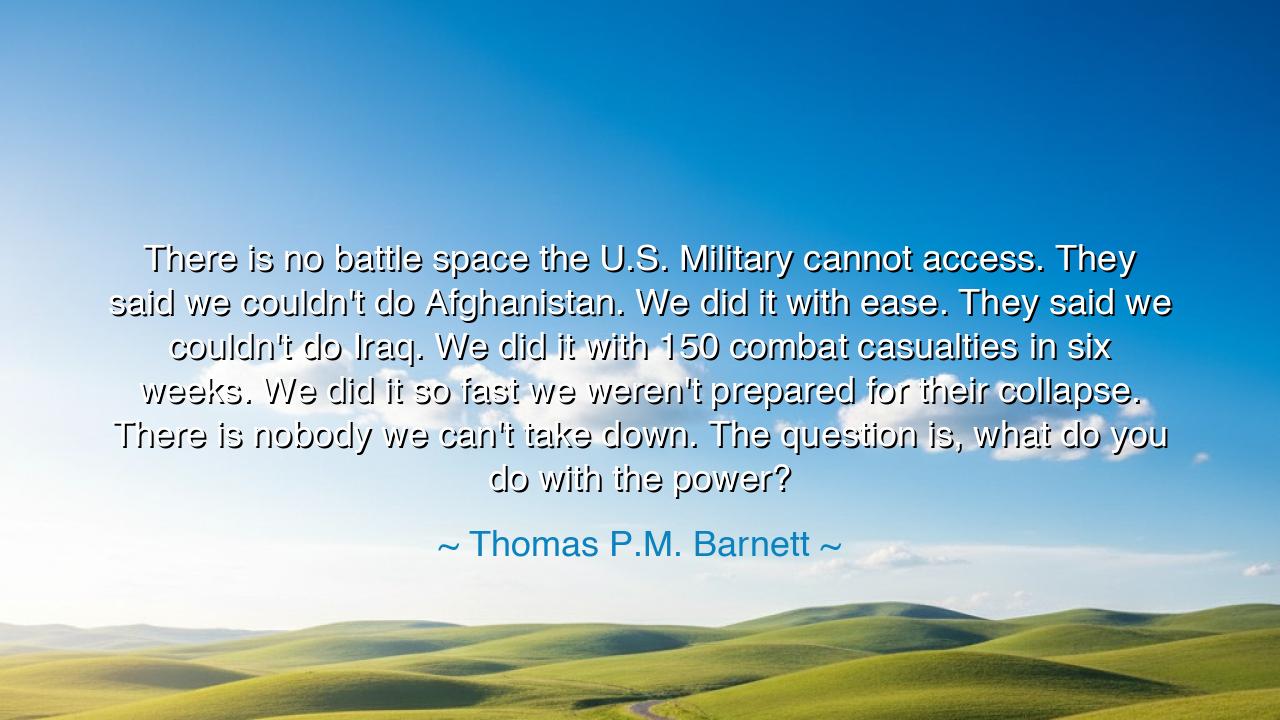
There is no battle space the U.S. Military cannot access. They
There is no battle space the U.S. Military cannot access. They said we couldn't do Afghanistan. We did it with ease. They said we couldn't do Iraq. We did it with 150 combat casualties in six weeks. We did it so fast we weren't prepared for their collapse. There is nobody we can't take down. The question is, what do you do with the power?






Hear, O seeker of wisdom, the thunderous words of Thomas P.M. Barnett: “There is no battle space the U.S. Military cannot access. They said we couldn’t do Afghanistan. We did it with ease. They said we couldn’t do Iraq. We did it with 150 combat casualties in six weeks. We did it so fast we weren’t prepared for their collapse. There is nobody we can’t take down. The question is, what do you do with the power?” These are not idle boasts, but a challenge, a reminder that the greatest danger is not in the gaining of power, but in the wielding of it. For to possess strength without wisdom is to be as a giant child, terrifying but blind.
For what is power? It is the ability to bend events, to shape destinies, to tear down walls that once seemed unbreakable. The armies of nations, the wealth of empires, the reach of technology—all these are instruments of power. But power in itself is not virtue. It is only potential, a raw flame that may warm or consume. Barnett’s words ring with ancient echoes, for the question has always been the same: once the walls are breached, once the enemy is vanquished—what do you do with the power?
History bears this lesson in many forms. Consider Alexander the Great, who swept across Asia like a storm, toppling kingdoms with speed that stunned the world. None could resist him; no battle space was beyond his grasp. Yet after his victories, when the dust settled, came the harder trial: governing. The lands he conquered strained under his rule, unity proved fleeting, and after his death his empire splintered like shattered glass. The sword won him the world, but wisdom to sustain it was lacking. Here lies the echo of Barnett’s warning: victory without vision leads not to glory, but to collapse.
So too with Rome. The legions marched across Europe, Africa, and Asia, their might unrivaled, their banners feared. They could take down any foe, any city, any nation. But Rome’s true greatness came not only from conquest, but from what it did with its power—roads that bound the world together, laws that brought order, aqueducts that carried life. For a time, power was channeled into creation, not merely destruction. Yet when Rome forgot this balance and turned its strength inward, fighting for dominance rather than building for the future, its empire crumbled beneath its own weight.
Barnett speaks of Afghanistan and Iraq not to revel in destruction, but to reveal the truth that speed and might are not the final measure of success. To win the battle is easy for the strong; to win the peace is the harder art. A collapsed foe is not yet a rebuilt nation. A vanquished enemy is not yet a lasting ally. Power without plan leaves ashes; power with vision can plant seeds that endure for generations.
The lesson for us, O children of tomorrow, is clear: in our own lives too, we will be given moments of strength, moments when we can win, overcome, or dominate. But the true question is not whether we can prevail—it is what we will do afterward. Will we use our strength to build, to heal, to uplift? Or will we squander it in pride, leaving ruin behind us? Every victory must be followed by responsibility, or else it becomes hollow.
Therefore, take this teaching into your heart: seek not only the might to conquer, but the wisdom to create. In your work, in your family, in your community—ask not only, “Can I overcome?” but also, “What shall I build once I do?” Let your power be a servant of vision, not vanity. For the greatest legacy is not in how swiftly we can bring down, but in how faithfully we can lift up.
So let Barnett’s words echo like a trumpet: There is nobody we cannot take down. The question is, what do you do with the power? Answer it with your life. Choose to build, to guide, to create, and your victories will not wither into dust, but will become monuments of meaning, standing firm when battles are long forgotten.






AAdministratorAdministrator
Welcome, honored guests. Please leave a comment, we will respond soon